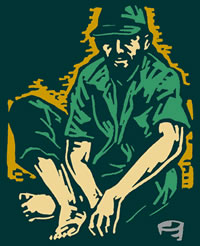
34th Sunday Year A - Christ the King
The tableau in today’s gospel concludes Matthew’s collection of the teachings of Jesus concerning the End. Unique to Matthew’s gospel, it is a masterpiece. Strictly speaking, it is not a parable, but an allegory – a narrative in which details have symbolic significance. It may be the development of a simple parable, in which Jesus likened the expected coming of the ‘Son of Man’ with divine authority (Dan 7) to a shepherd ‘separating sheep from goats’. It provides, in a simple form, a splendid summary of the teaching of Jesus in Matthew’s gospel, concerning the living of our Christian faith.
For the first Christians, Jesus was the ‘Son of Man’, invested in his risen glory with divine authority (Mt 26:64). In today’s second reading, Paul celebrates the divine authority with which the Saviour brings his saving work to completion. In the triumph of the resurrection he has authority over the whole of creation; when ‘the end’ comes, having overcome all the forces of evil, he will deliver the New Creation into the hands of his Father, and those who share in his triumph will rejoice in a divine generosity that has no limits. Paul’s account of ‘the end’ is somewhat overwhelming. Matthew’s tableau, on the other hand, presents the final Judgment in terms that are easy to understand – terms that can be related to the ways of God that found expression in the Sermon on the Mount. Despite its simplicity, however, the more we ponder this tableau the more we come to appreciate how rich it is in inspiration for those who want to live as followers of Jesus.
The criterion by which we will be judged when we come into the presence of God is practical, simple and clear. It is not so much what we do for the God ‘we cannot see’ that matters, in the end, but what we do for one another – expressing the fact that we are true children of the same Father (cf.1 Jn 4:20). And among God’s children it is the poor and needy who should have our special care – our ‘preferential option’. The things that will establish our worth in the sight of God, and our readiness to share in God’s friendship, are simple things, possible to all, learned and simple, rich and poor. What overturns our expectations and is immensely reassuring is the fact that those who have proved themselves worthy of hearing the Lord’s invitation – ‘Come, you whom my Father has blessed, take for your heritage the kingdom prepared for you since the foundation of the world’ – may well be taken unawares. Responding to the grace of God, working in them ‘in a hidden way’ (Gaudium et spes, n.22), they have shown themselves true children of the Father – helping for the sake of those in need, without any thought of a reward. Matthew’s tableau finds a place among the elect for all who fight unselfishly humanity’s ancient enemies: ‘ignorance, poverty, disease, injustice, bigotry, death of body or soul’ (B. Vawter). The greatest inspiration of all, however, is found in the Lord’s affirmation, ‘You did it to me’. Sharing our humanity and experience in a struggling world, the ‘Son of Man’ has made himself one in a privileged way with those in greatest need.
Placing us on the threshold of the final Kingdom, this tableau gives us a glimpse of what it will be like – one family of the Father, united in God’s generous and merciful ways. Today, we venerate Christ the King; today’s gospel reminds us that it is only in his final ‘glory’ that he exercised his kingship. Among us, he makes himself the ‘Servant’ of all.
John Thornhill sm

